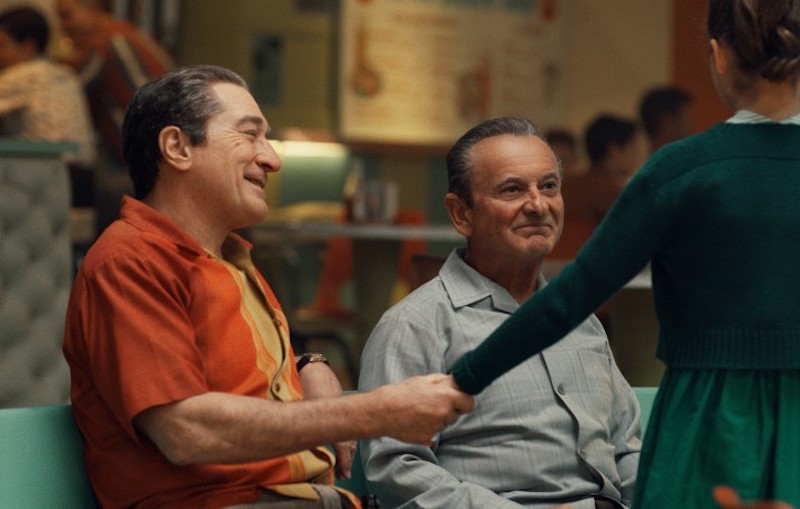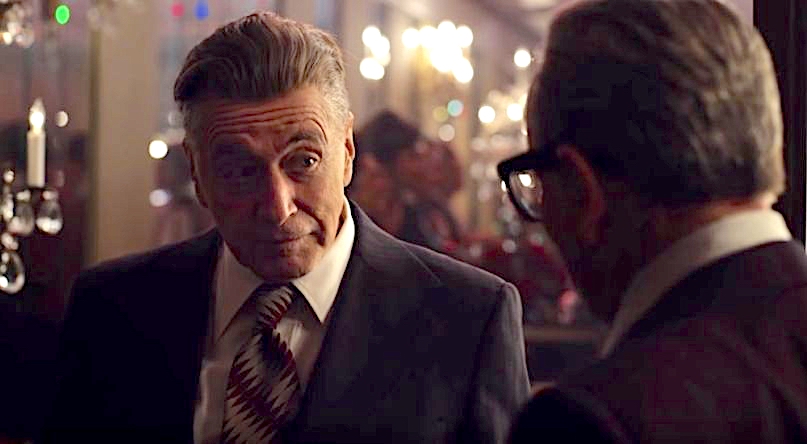In gangster movies, the audience usually worries about who’s going to get killed (or “whacked,” in mafia parlance), but what about the poor bastards who survive and grow old, haunted by a life of bloodshed and treachery?
How do the survivors of such an existence reach for the last scraps of humanity when they never recognized it in the first place? The Irishman, Martin Scorsese’s new three-and-half-hour epic, is a rumination on the intricacies of memory, the depths of shame and the slow death of the soul. It’s also a masterpiece. Scorsese has done gangster films before of course, but this is not the usual Scorsese fare. Sure, there are scenes of explosive brutality set to a soundtrack reflecting the era, which is his trademark. And he’s back with Robert DeNiro and Joe Pesci, the actors that made him the go-to director for gangster pictures. But if the castings suggest any danger of re-hashing the pair’s iconic characters from Casino and Goodfellas, that’s not the case. This time the characters are drawn with even more detail, and Scorsese approaches his subjects with more of a slow burn reminiscent of Ingmar Bergman instead of his usual Sam Peckinpah gusto. The result is a profound and unexpectedly confessional reflection on violence and regret during ’60s one of our country’s darkest periods.

De Niro and Pesci together again amuses us. (Netflix)
De Niro plays the titular Irishman, Frank Sheeran, a WWII veteran and truck driver in Philadelphia, seduced into organized crime by mobster Bill Bufalino (Pesci, in an uncharacteristically restrained, but still menacing performance). Sheeran is soon carrying out mob contracts with a requisite detachment he learned as a soldier in the war. Eventually, Bufalino puts Sheeran in touch with the infamous Teamsters president, Jimmy Hoffa (Al Pacino), who enlists him, first as his bodyguard, then as a union leader. Soon, the two men create a tight bond, characterized by respect, humor and old school camaraderie. The narrative unfolds in a series of flashbacks as an older Sheeran tells his story from a retirement home.
Cinematographer Diego Pietro (The Wolf of Wall Street) captures these memories with distinct colors, distinguishing each era with its own palette. The younger incarnations of DeNiro, Pacino and Pesci have been touched up by CGI. It’s a little jarring at first, but you quickly forget about the digital enhancement, simply because the story is so entertaining and immersive. Frankly, the movie wouldn’t hold the same visceral punch with younger actors playing these ubiquitous veterans.
Based on the 2004 book, I Heard You Paint Houses, screenwriter Steve Zaillian, who won the Academy Award for 1993’s Schindler’s List, crafts a labyrinth-like tale, albeit one that is continually engaging and seamlessly connected. As Sheeran and Hoffa’s friendship strengthens, the unabashedly brazen Hoffa finds himself in hot water with Robert Kennedy’s Senate Rackets Committee, the Justice Department, and ultimately with his friends, the mobsters themselves. This might sound plodding and overly ambitious, but nothing could be further from the truth. In true Scorsese fashion, The Irishman moves along nicely. It’s vibrant, emotional, dynamic, even hilarious. The acting here is electric. Watching this film, you realize why this generation of actors are now considered American treasures. DeNiro’s deftly controlled turn as a man at war with himself is heartbreaking. Pesci is terrifying, but wholly human. Anna Paquin as Sheeran’s daughter makes the most her few lines; her potent stare says it all.

Say hello to Pacino’s not so little role as Hoffa. (Netflix)
They are all Oscar-worthy performances. But the veteran who shines brightest here is Al Pacino as Jimmy Hoffa. Traditionally, Pacino has a penchant to spill into self-parody with his characteristic bombast (Scarface, The Godfather, etc). But not in his very first Scorsese film (yes, it really is his first). In The Irishman, Pacino plays Hoffa as an explosion of complexities. He’s egomaniacal and cantankerous, but also gregarious and uniquely honorable.
The Irishman is Scorsese’s elegy to the gangster picture. Every inch of the way, he demystifies the glamour of the mafia; stripping away layers of the façade, until there is nothing but an ominous void. As Clint Eastwood accomplished in Unforgiven, Scorsese lays bare the real nature of a life of carnage. You can see it in a broken man’s gait in his last years; in a daughter’s eyes as she watches her father leave the house in the middle of the night; in the puzzled stare of a murderer as he chooses between faith and nothingness.
In a career that gave us gems such as Taxi Driver, Raging Bull, The King of Comedy, Alice Doesn’t Live Here Anymore, Goodfellas, Casino and The Wolf of Wall Street, The Irishman is another classic about social pariahs who liv e and die by their own codes. This time, however, Scorsese takes a reflective step back, ponders, then goes straight to the core.
The Irishman is currently in limited release in theaters, and will widen, adding cities over the next few weeks. It will be available for streaming on Netflix, Wed., Nov. 27.
Advertising disclosure: We may receive compensation for some of the links in our stories. Thank you for supporting LA Weekly and our advertisers.

